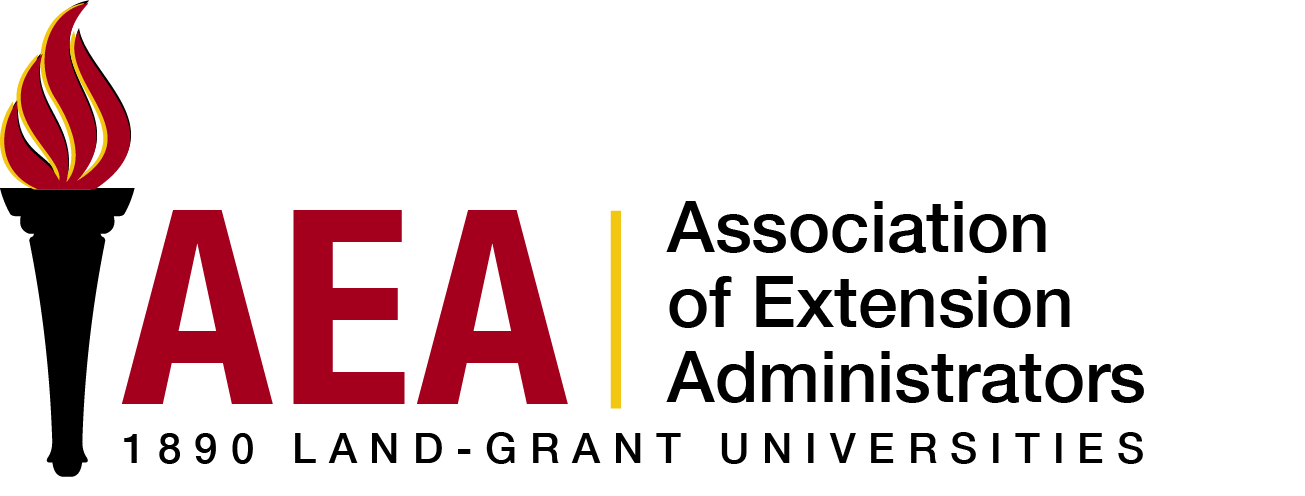Extension Today
News from and about the 1890 Land-Grant Extension SystemMessage from the Chair
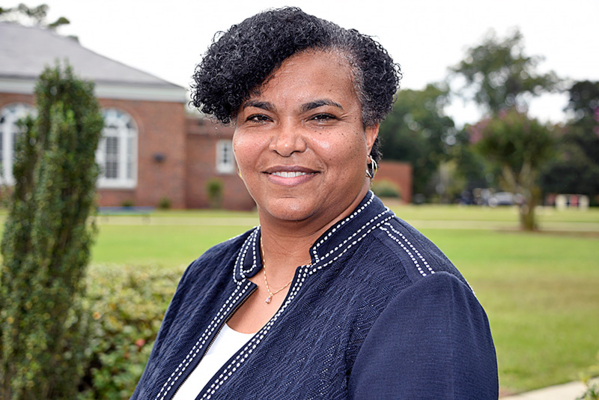
Vonda Richardson, Extension Administrator, Florida A&M University
Happy Thanksgiving!
Extension Today is a monthly, digital newsletter intended to highlight 1890 Cooperative Extension.
This month, we are highlighting family and consumer sciences (FCS) programs and the impact these programs have on families, individuals and communities.
FCS involves improving the well-being of the family through programs and assistance that educate and help families incorporate research and evidence-based information to work in their lives. 1890 Extension professionals develop programming based on locally identified needs, particularly the unique needs of underserved and limited resource families. AEA applauds our FCS leaders, educators and volunteers!
Are your affairs in order?

A 2021 Gallup poll revealed that although Americans believe estate planning is important, only 46 percent of adults have a will. The good news is that individuals with wills have risen since the COVID-19 pandemic, particularly among young adults 18–34 years of age. Yet, many still procrastinate when it comes to putting their affairs in order.
The Successful Aging Initiative (SAI) offered by the Alabama Cooperative Extension System at Alabama A&M University educates the public about the importance of estate planning. Participants learn about basic estate planning terms and documents, such as power of attorney, an advanced directive, a trust and the importance of a will. They also learn about resources where they can obtain estate planning assistance.
Last year, 5,330 individuals participated in the SAI program under the statewide direction of Extension Specialist Dr. Dorothy Brandon. Along with estate planning, the program also educates the public and older adults about financial abuse and exploitation, how to make wise decisions regarding health and financial needs, fall prevention and other activities that promote healthy aging.
CSU Extension mobile kitchen takes programs to its audiences across Ohio
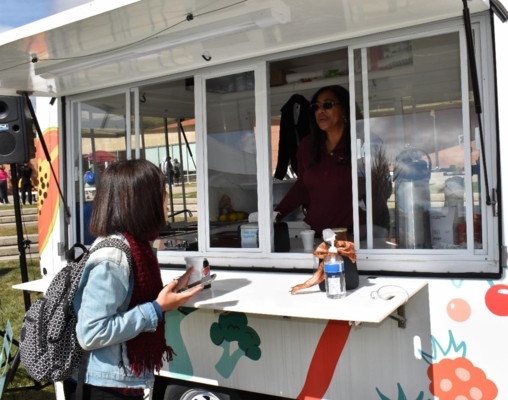
Taking its educational programs on the road, the Central State Extension Family and Consumer Sciences Program has been using its new mobile kitchen this year for a variety or special events, health fairs, farmer markets, resource fairs and more.
The 8-by-14-foot kitchen is built on a trailer and includes a refrigerator, freezer, oven and pop-up sides. A small television screen is used to expand the viewing area. Two mobile kitchens are currently being used - one based in Eaton in western Ohio and one based in Canton in northeastern Ohio.
Food preservation and preparation, as well as cottage food industry sessions, are a few of the topics that have been shared with Ohio residents. For more information, visit www.CentralState.edu/csuextension.
Nutrition + fitness + children = DSU SNAP-Ed
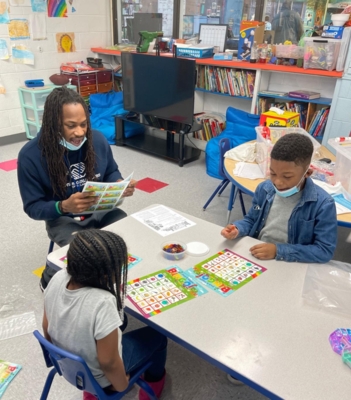
During the month of November, Delaware State University Cooperative Extension spotlights Denise Pinkett-Wynn and her family and consumer sciences efforts.
Pinkett-Wynn is a 1987 DSU alumna. Though she began her career working in banking for Discover credit card, where she honed her work ethic and management skills, she relishes the ability to use her foods and nutrition degree as the coordinator of the Supplemental Nutrition Assistance Program Education (SNAP-Ed) for Extension.
Pinkett-Wynn works in DSU’s Wilmington office in New Castle County, which has the largest population of Delaware students in SNAP-Ed. The federally funded program is governed by the U.S. Department of Agriculture’s (USDA) Food and Nutrition Service and represents one aspect of the Delaware Cooperative Extension partnership between DSU and the University of Delaware. By focusing on nutrition, stretching food dollars and physical fitness, the state partners help Delawareans build healthier communities. The program was first introduced to DSU’s Extension audience in 2006.
“SNAP-Ed is a combination of educational strategies supported by policy systems and environmental innovations,” Pinkett-Wynn explained. “The main objective of our work is to facilitate an adoption of a change in behavior.”
FAMU Extension agent becomes HUD-certified housing counselor
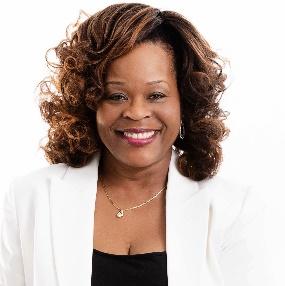
Florida A&M University’s Family and Consumer Sciences Program has partnered with the University of Florida to expand housing education. FAMU’s Cooperative Extension Program Office now has its own Housing and Urban Development (HUD) certified housing counselor on staff - Extension agent Donna Salters.
The goal of the HUD Housing Counseling Program is to support delivering a variety of housing counseling services to homebuyers, homeowners, low- to moderate-income renters, seniors and the homeless.
The primary focus of the program is to improve financial literacy, expand homeownership through purchases and down payment assistance opportunities, improve access to affordable housing and rentals, and preserve homeownership even through foreclosure prevention. This program will also offer some technical support with heirs’ property issues.
For questions and more information, contact Salters at donna.salters@famu.edu.
Extension agent assists Georgians during high-cost time
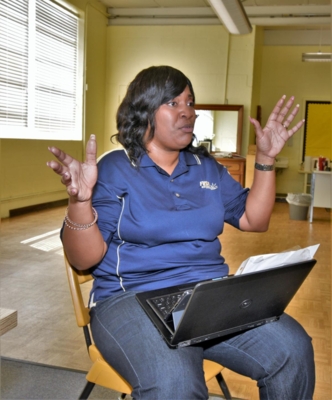
Millicent Price, Fort Valley State University’s family and consumer sciences agent in Crawford County, has been assisting clients on how to access and utilize funds provided through the Office of the Governor.
The Department of Human Services received $1 billion to provide cash assistance of up to $350 for active enrollees of Medicaid, PeachCare for Kids, the Supplemental Nutrition Assistance Program (SNAP) and/or Temporary Assistance for Needy Families (TANF). Funds for this award derived from the State Fiscal Recovery Fund, which was part of the American Rescue Plan Act.
Georgians who are enrolled in more than one of these programs received a one-time cash assistance payment. Price informed clients of the appropriate way to access the money through their payment card. She also educated them on ways to use the funds to provide low-cost, high-nutritional foods for their families during this high-cost time.
Parenting program makes positive impact on the lives of families
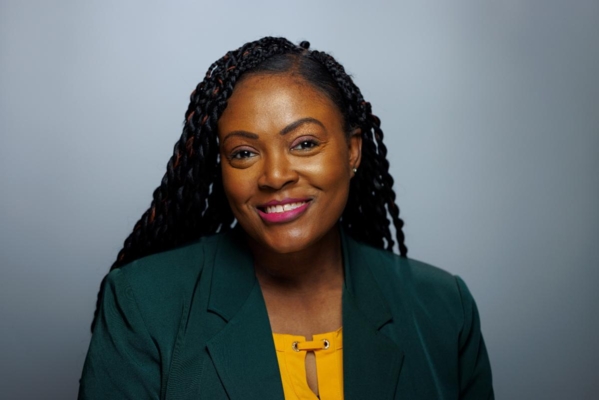
Kentucky State University’s Cooperative Extension Program offers the C.A.R.E. program within Hardin County, Kentucky, to address the needs of families who have experienced challenges in providing the necessary resources for their children.
When parents are brought to court for neglect of a child, in some cases the children are temporarily placed in foster care or with temporary guardians within the family while the parents complete the requirements to reunite with their children.
In 2022, eight families completed C.A.R.E. programming and reunited. The C.A.R.E. parenting program assists parents by providing educational resources on how to establish more effective discipline techniques for their children, how to manage conflict and how to develop techniques to ensure that they are providing a safe home environment for their children. Class topics include Discipline Techniques, Keeping My Children Safe and Brain Activity in Adolescents.
This program, conducted by family and consumer sciences agent Chandra DeRamus, has had a tremendous impact by increasing the number of families who are able to reunite with their children in about 98 percent of the cases. The program also helps the parents to realize other goals related to getting better jobs and reaching their personal goals to have a better lifestyle for themselves and their families.
Langston University Cooperative Extension & Outreach Program impacts families through monthly storytime
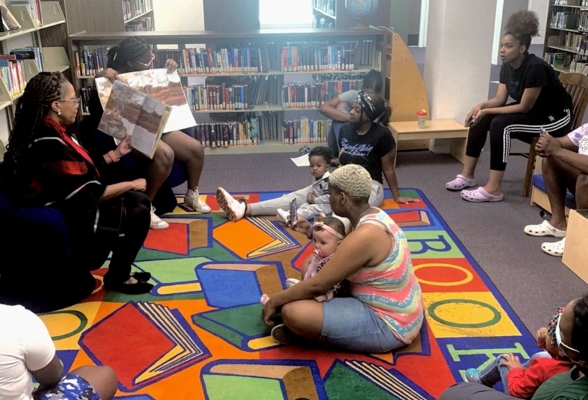
The Langston University Sherman Lewis School of Agriculture & Applied Sciences and Cooperative Extension Outreach Programs of Family and Consumer Sciences (FCS) presents Family Storytime.
Storytime is a monthly in-person read-out-loud series sponsored by the Child Care Access Means Parents in School (CCAMPIS) grant provided through the United States Department of Education. This service is provided for Langston students, faculty, staff and their young children during the fall and spring semesters. Each series focuses on family, community outreach and literacy. The children’s section of the Langston University G. Lamar Harrison Library is where families engage. The importance of reading to children and positively impacting a child's cognitive growth and development was the catalyst behind the creation of the monthly series.
Family Storytime aims to help children enrich their vocabulary, develop literacy skills, practice appropriate reading behavior and increase school readiness. The FCS faculty, staff and FCS club members coordinate to offer book readings, arts and crafts, and book giveaways. Arts and crafts extended activity incorporates a multisensory approach while the book giveaways increase access to printed reading materials. A virtual option is made available for those unable to attend in person.
Victoria Johnson, senior criminal justice major, and mother of 2-year-old Val recently stated, "The series has allowed my daughter and me to bond and meet other parents who are engaged in their child's learning experience. My daughter's favorite moment is picking out her book at the end. Family Storytime has been a blessing to my daughter and me. We both look forward to attending each month."
Lincoln University Cooperative Extension impacting communities through workforce development
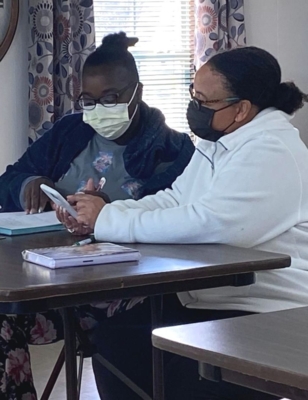
By Adrienne Hunter-Green, Regional Educator - Family, Community and Consumer Science Program
A program that has been making an impact in southeast Missouri since 2021 is the Lincoln University Cooperative Extension (LUCE) Southeast Missouri Workforce Development Program. This program trains men and women in learning and developing personal and professional soft skills to upskill workers and prepare them for long-term success.
In response to the 2020 Census data on poverty levels in the Bootheel, the initiative sought to increase economic stability and growth by providing skills training to create a competitive workforce for community members. Local citizens and participants from Metropolitan Employment Rehabilitation Services (MERS) Missouri Goodwill Senior Community Service Employment Program (SCSEP) attended the program led by facilitators Adrienne Hunter-Green, the Rev. Dinah Tatman and Darrel Martin Sr.
Despite the loss of lead facilitator Martin, Hunter-Green and Tatman remained committed and resilient. Understanding its impact, they continued the project and added a hybrid component, providing an additional element for distance learning.
Kids in The Kitchen offers healthy recipes, family fun
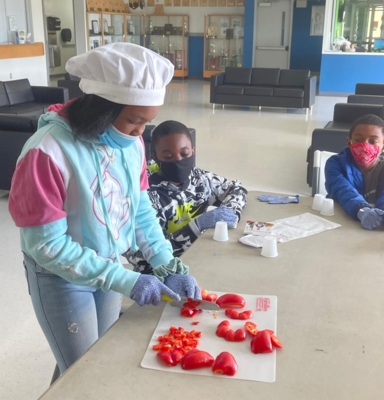
Ten-year-old Zamiya Marrow dreams of becoming a master chef. A summer program through Cooperative Extension at North Carolina A&T has played an important role in her culinary education.
“I really like to cook and try new foods and spices,” said the fifth-grader who lives in Henderson. “In my last class, I tried an Indian dish.”
Zamiya participates in Kids in the Kitchen, a program offered through the Expanded Food and Nutrition Education Program and the 4-H program in Vance County. Virtual and in-person classes offered during the past three summers have given children a chance to do cooking demonstrations and gain an introduction to international cuisines and cultures.
The program targets children in grades 3-8 and encourages families to cook and eat healthy meals together at home. The 2021 program taught children and their families the basics of Italian cooking. In 2022, participants learned about cuisines from all over the world. Participants receive all the ingredients for a healthy recipe once a week. They also are encouraged to cook together with family members during monthly sessions offered virtually and in person.
SC State College of Agriculture, Family and Consumer Sciences launches international partnerships in Guyana
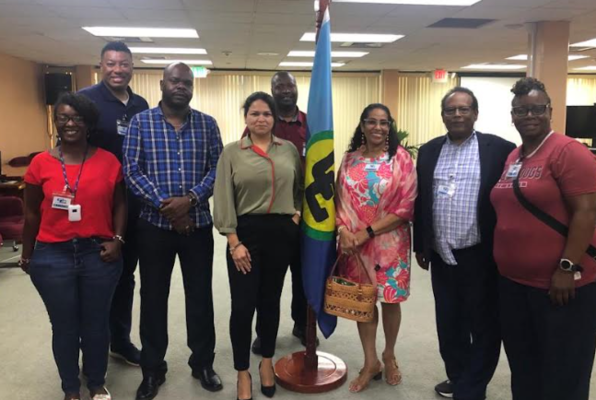
Faculty and staff from South Carolina State University’s College of Agriculture, Family and Consumer Sciences (CAFCS) embarked on a seven-day international journey to South America where they visited the country of Guyana.
During Guyana Agriculture Month, Dr. William Whitaker, CAFCS acting dean; Dr. Maria James, acting chair of the Department of Family and Consumer Sciences; Dr. Moreen Joseph, assistant professor of nutrition; Dr. Haile Selassie, professor of agribusiness and economics; Odeidra Williams, director of public relations for the CAFCS; and Dr. Learie Luke, director of the International and National Student Exchange Program, traveled to initiate collaborative partnerships between SC State and critical governmental and educational institutions in the nation.
“We all acknowledge the critical nature of agricultural policies and production,” Whitaker stated. “Collaborations and cultural exchange are the types of actions that the College of Agriculture, Family and Consumer Sciences pledges to take. We want to be the good stewards of the founding and current tenets of SC State, and we plan to establish a strong global presence in the immediate future to continue to elevate the university.”
The team joined hundreds of people from Guyana’s 10 regions to celebrate the country's growing presence in global agriculture, toured numerous farms at the University of Guyana and discussed ways to enhance national and international agricultural sustainability.
SU Ag Center’s family and consumer sciences unit focuses on supporting students, community

Family and consumer sciences (FCS) focuses on the science or art of living and helping communities thrive and engage. The Southern University Ag Center’s Cooperative Extension Program’s FCS unit aims to support the entire family in various ways.
The team engages families through the following programs: JAGricultre (Emergency Preparedness, Response and Management); Nutrition Education Programs (SNAP-Ed and EFNEP); Public Health, Communities of Color Network (Smoking Cessation); Family and Human Development (Parenting, Health Literacy); Nutrition and Wellness, Small and Rural Business Development; Broadband Equity; and so much more.
Additionally, the FCS programs have taken the initiative to engage and educate Southern University students. Within the last month, they provided services, education and outreach to more than 1,500 students and the countless communities they serve.
For additional information about the FCS programs, contact Dr. Krystle Allen, program leader of FCS, at krystle_washington@suagcenter.com.
Professor’s $50,000 grant to revolutionize fashion program
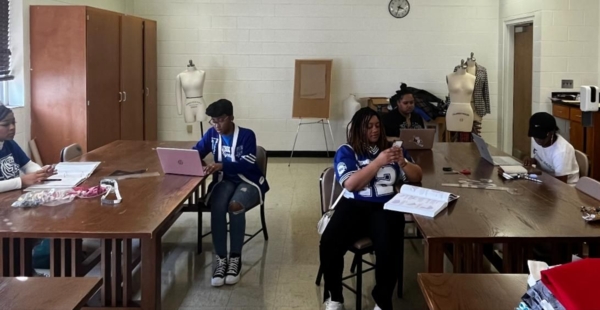
By Dr. LaPorcia Davis and Joan Kite
Dr. LaPorcia Davis, who oversees the Fashion Merchandising and Product Development Program, received a $50,000 grant from ICON360xGAP Inc. The grant will be used to create a fashion innovation and technology lab that includes 3D printing design equipment, 3D body scanners and digital textile printers.
“Students can print their own custom designs,” Davis said. “This is much-needed innovation in the classroom.”
Advancing the technology within the Department of Human Sciences allows students to become more creative in many ways for product development and design. This is the second $50,000 grant from ICON360xGAP Inc. The first one was obtained by Dr. Valerie Oates, interim department head of human sciences.
“The labs are in need of updating,” Oates said.
This latest grant will also help prepare students to become industry ready while enhancing their classroom experience. Davis plans on taking 14 students to tour the Los Angeles Fashion District in February. In addition, she is in the process of planning a fashion-focused study abroad trip to Siena in Tuscany, Italy.
Lastly, grant funding will be allocated specifically for scholarships for fashion merchandising and product development students. Davis said she intends to create smaller scholarships so she can assist rising sophomores and students who are new to the program.
UAPB provides child care, Extension outreach to community
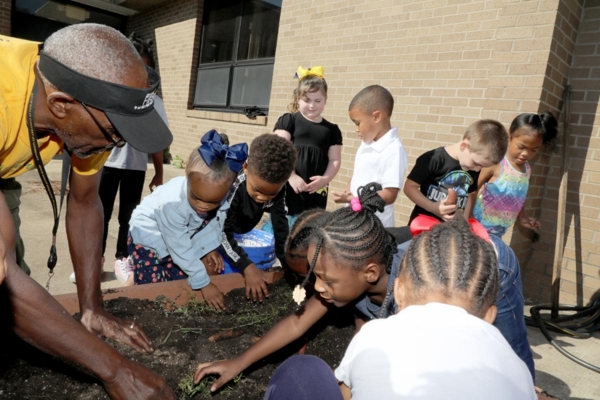
Under the direction of the Department of Human Sciences, the University of Arkansas at Pine Bluff (UAPB) Child Development Center (CDC) provides child care to UAPB employees and students and the community. UAPB’s Cooperative Extension Program serves as a resource to the center by providing training and support to children, parents and teachers.
“Beginning in the 1940s, the CDC opened its doors as women began entering the workforce,” according to Dr. Marilyn Bailey, interim chair of the Department of Human Sciences. “At the time, child care was a relatively new concept, but UAPB began fulfilling the service.”
Today, the CDC uses a comprehensive approach to address the holistic needs of children and families, Bailey said. At intake, families may seek help acquiring skills in cooking and nutrition, financial literacy or anger and stress management. Cooperative Extension serves as a resource to address these needs.
UAPB’s Extension faculty and staff work hand-in-hand with human sciences faculty to provide services to the center. Dr. Obadiah Njue, assistant dean of Extension and outreach, serves as the community liaison.
“This summer, Dr. Njue and undergraduate students provided an opportunity for CDC children, their parents and teachers to plant and harvest a garden,” Bailey said. “This experiential learning is invaluable in providing knowledge about the life cycle of fruits and vegetables from the farm, including raised beds and containers, to the table.”
UMES Extension FCS provides for parenting, food access programs on Lower Eastern Shore
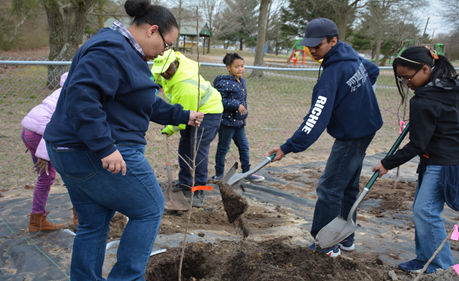
University of Maryland Eastern Shore (UMES) Extension’s Family and Consumer Sciences (FCS) Program, in collaboration with the Well Connected Communities (WCC) project, a Robert Wood Johnson Foundation Culture of Health Initiative, reaches residents in the Tri-County area of the Lower Eastern Shore of Maryland through comprehensive Parenting and Food Access programs.
“Initiating a coalition-building process and establishing a health council helped develop community gardens and mini orchards,” said Dr. Virginie Zoumenou, 1890 Nutrition and Health Programs director at UMES. “Community events focusing on food resources management and food preservation have also been organized under the auspices of the FCS program.”
A canning club is in the works to help “empower low-income families to provide for themselves and make healthy fruits and vegetables available in all seasons.” Socialization events and free tutoring programs for youth organized by the Well Connected Communities, she said, allow family and consumer sciences to implement parenting sessions.
“For successful FCS programs, community engagement is a priority at UMES," Zoumenou said.
Extension associate teaches healthy cooking through online education
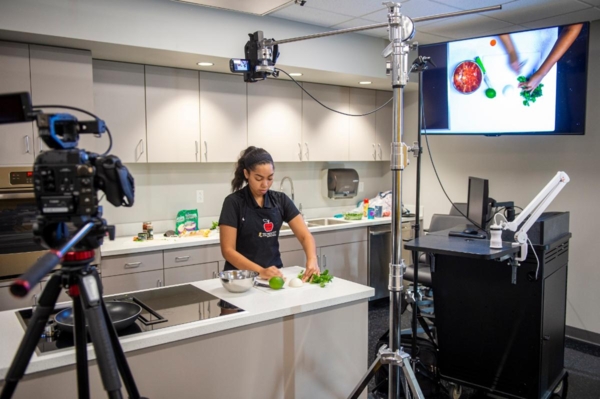
Through the Expanded Food and Nutrition Education Program (EFNEP), West Virginia State University (WVSU) Extension educator Kateira Hogan has taught more than 1,000 kids about healthy eating and cooking with virtual cooking demonstrations and education. She is teaching safe food handling and preparation, healthy eating and nutritious recipes to kids in middle schools throughout Kanawha County.
The goal, Hogan says, is to teach the kids to be able to prepare an easy, healthy and nutritious meal, and by sharing that knowledge with parents, caregivers and siblings, the entire family will benefit.
“Through EFNEP, students learn kitchen basics like how to use measuring spoons, measuring cups and other food preparation tools,” said Hogan. “The curriculum covers the main food groups and proper portions to make a healthy meal.”
While EFNEP is typically conducted as a supplemental in-class or after-school program, Hogan shifted the program into Kanawha County Schools’ Schoology program. WVSU Extension Service also provides EFNEP education to adults in a multi-county region of central and southern West Virginia.
